[Big read] Liu Chang: The reluctant heiress who saved her father’s agriculture empire

As New Hope plunged into deep losses, Liu Chang faced a role she never sought. In rare candour, the reluctant heiress reflects on the strain of succession, the crisis that defined her and how she ultimately steadied her father’s agriculture empire, in an interview with Lianhe Zaobao’s Li Yaning.
“I’m not like the heroes of the founding generation, I don’t have a story, I am the result of a process.”
Liu Chang, chair of the Chinese agribusiness company New Hope Liuhe (新希望六和), sat down with Lianhe Zaobao for an interview at the company’s overseas headquarters at Kallang Way, Singapore. Liu’s hair, which she had cropped because of work stress two years ago, had grown longer. As she faced the camera and talked about her company, family and life choices, her tone was light-hearted with a few jokes occasionally thrown in.
For Liu, the most challenging moments have come to pass. In 2024, the company finally stemmed the losses after three years in the red. For the first time in nearly five years, the company made a profit in the first half of this year.
In September this year, Liu received the Young Achiever Award from Business China — an organisation founded by Singapore’s founding Prime Minister Lee Kuan Yew to promote Singapore-China cooperation. As the award’s upper age limit is 45, Liu joked that it was a “surprise,” saying she hadn’t expected to still qualify as “young”.
Fall from grace
The “young” Liu has already been with New Hope Group, founded by her father Liu Yonghao, for 23 years.
Founded in 1982, the company, one of China’s first private conglomerates, is currently ranked 19th in China’s top 500 private sector companies, and comes in second among China’s agricultural firms. New Hope Liuhe is the group’s largest subsidiary — its main business is animal feed production, and pig breeding and slaughtering.
By 2021, the price of live pigs had entered a downward spiral, and New Hope, which had just expanded production capacity, suddenly found itself in a predicament, racking up massive losses exceeding 9.5 billion RMB.
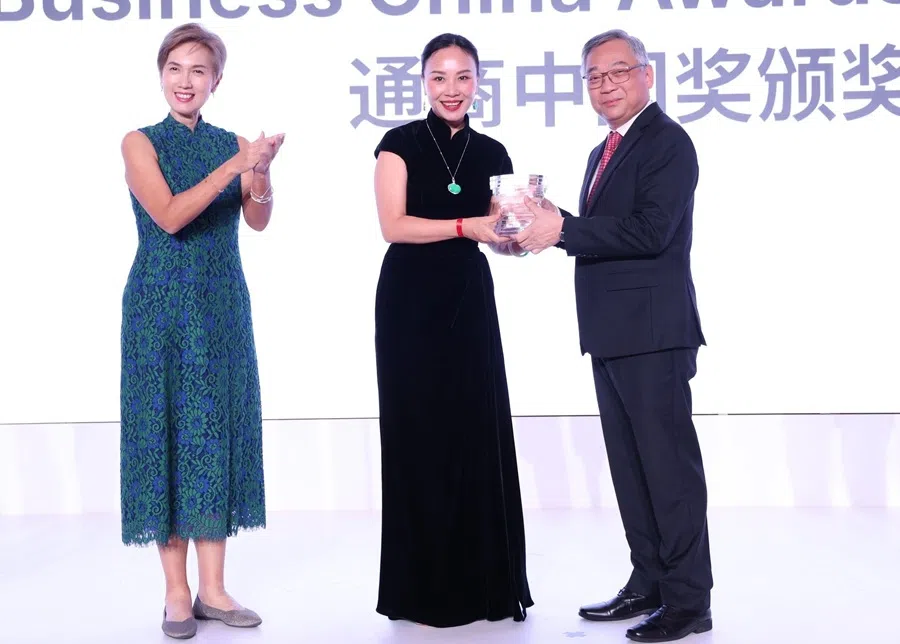
In 1995, Liu Yonghao and his three brothers topped Forbes China’s richest list with a fortune of 600 million RMB (around US$85 million). In 2001, the Liu brothers came out top on both the rich list of Forbes China and Hurun China, and were seen as the first generation of the super-rich in China.
Twelve years ago, Liu Yonghao decided to step back at the age of 62, handing over the reins of the business to Liu Chang, who succeeded him as chair of the company.
During an interview in early 2021, Liu Yonghao proudly praised his daughter for doing well as his successor, leading the business in growing its market capitalisation from 27 billion RMB at the time she took over, to over 100 billion RMB by the end of 2020.
But the fall from grace was rapid, by Liu Chang’s account — when it rains, it pours; and crisis cropped up after crisis.
By 2021, the price of live pigs had entered a downward spiral, and New Hope, which had just expanded production capacity, suddenly found itself in a predicament, racking up massive losses exceeding 9.5 billion RMB.
She dreamt of being in meetings, getting so worked up she started shouting and waving her fists, before waking up crying.
Three years of losses
As head of the company, Liu Chang bore the brunt of the mounting losses. The growth factors of the past no longer stood, forcing her to come up with a new strategy. “What doesn’t break you makes you stronger. And when the break is too severe, you have to get stronger more quickly — it was an extremely stressful time,” she said.
Years of losses gave her frequent nightmares. She dreamt of being in meetings, getting so worked up she started shouting and waving her fists, before waking up crying. Her husband had twice been physically hurt by her night terrors. When she decided to lop off her long tresses, the idea had also come to her in a dream.
Under extreme pressure, she kick-started a plan for the company to trim the fat, selling off assets and focusing her efforts on reducing liabilities to clean up the balance sheet.
She also instilled a “wartime culture”, determined to eliminate corporate rot, emphasising that management had to serve operations. At a vital moment, Liu took the most direct path, first asking for presentation decks to be cut. She requested that those reporting to her keep their presentations to three pages, and imposed a ten-person limit at decision-making meetings.
She stepped out of the office, taking the management team with her to factories, villages, wholesale markets and delivery centres both at home and abroad, sharing meals with pig farmers, pig sellers and distributors, going on study trips to small companies, and hearing out problems. From adjusting the interest rate for loans to farmers, to product customisation and sales optimisation, she implemented the transformation from the front line.
During those two years, Liu Chang spent countless hours on trains and planes, eventually reaching a point where she could no longer straighten her back. She had to be wheeled into meetings lying flat.
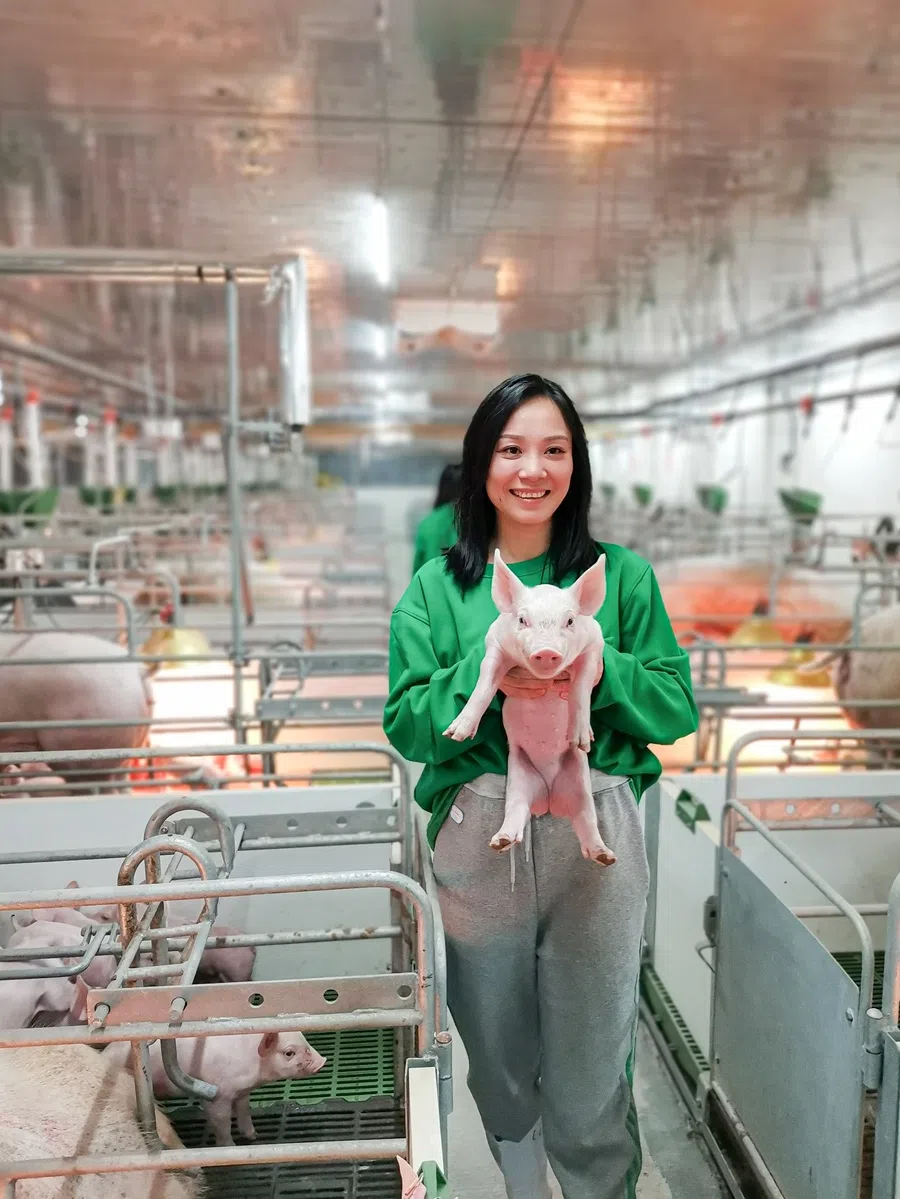
During those two years, Liu Chang spent countless hours on trains and planes, eventually reaching a point where she could no longer straighten her back. She had to be wheeled into meetings lying flat. Yet, rather than expressing frustration, she recounted these challenges with a wry smile, turning them into amusing anecdotes.
Liu said that the physical exertion turned out to be the perfect antidote for her anxiety, and helped rebuild her. “Compared with many of my friends, the breadth of my experience comes from having personally met producers and farmers, and in meeting with them and understanding them, I truly come to see the world and real life, and to experience truth, goodness, beauty, trust, faith and connection,” she shared.
Taking a long-term view
In 2024, New Hope finally stopped making losses and turned a profit. But even with the pig market cycle now back to normal, Liu Chang remains vigilant and is drafting a strategic and talent development plan for the next few years, to ensure operational sustainability over the long term.
She said, “We are not comparing ourselves with others to become the biggest business of the moment, we want to make sure over the long term that we will be stronger and more promising.”
Challenges are never in short supply. This year, China has implemented measures to regulate pig production, aiming to prevent sharp price fluctuations by reducing about one million breeding sows. Liu Chang said the policy has a direct impact on people’s livelihoods. She emphasised that only by honing capabilities, responding calmly and expanding into overseas growth markets can the company achieve more balanced overall performance.
She spoke enthusiastically about a 15-day trip to Egypt last year, during which she explored small restaurants and local agricultural markets — an experience that gave her the confidence to expand the business there. Since then, the company’s operations in Egypt have grown by 50%.
Surviving the years of heavy losses has led to Liu’s maturation in attitude and mindset; it has also enabled her to become the backbone of her team. “My subordinates told me that since they have been in the trenches with me, they are sure I must be incredibly strong now,” she recounted, “I feel embarrassed to tell them at night I still think about everything that happened.”
“We needed a centre that was credible, fair and physically and geographically feasible,” Liu explained. “I felt that Singapore was the only choice.”

She said she still wakes up in the middle of the night because of thoughts about work, but she no longer feels anxious or emotional. Now when she wakes up in the night, she would walk around or listen to a podcast before going back to sleep, “I tell myself, Liu Chang, you’re doing much better.”
Deep ties with Singapore
New Hope was already preparing to venture abroad back in 2000, and it set up its first overseas plant in Vietnam. Liu Chang accompanied her father on an overseas work trip at that time and discovered the potential of the market. The Vietnam venture was a great success.
As an agriculture firm, New Hope had clearly defined prerequisites for the markets it wanted to enter: it sought developing economies with a large population base. Southeast Asia, given its proximity to China, was the top choice.
But conditions in the region were complex, and uncertainty in currency exchange rates, talent, trade and legal requirements were all barriers, presenting many pitfalls.
“We needed a centre that was credible, fair and physically and geographically feasible,” Liu explained. “I felt that Singapore was the only choice.”
In 2010, the group set up its overseas headquarters in Singapore. Like many entrepreneurs, she mentioned Singapore’s well-recognised advantages in having sound legal and financial systems, the availability of multiple currencies, international talent and government support.
But Liu’s personal connection to Singapore goes even further back.
As a child, her initial impression of Singapore came from watching the Singaporean TV drama Takeover (《人在旅途》). When she visited Singapore with her parents for the first time in the 1990s, the public housing estates and tropical rainforest were etched in her memory. Later on, she joined the youth wing of the Singapore Chinese Chamber of Commerce and Industry, and still maintains contact with many friends in Singapore today.
Given her dreams of becoming a celebrity, is taking over what is clearly an unfashionable pig farming business going against her true calling?
Shattered dreams of becoming a singer
Her father was once China’s richest man, and at 33, she took over the running of the family business, so the media spotlight has never been far from Liu Chang’s life.
Past media reports presented another side of a younger Liu — youthful, flamboyant and even a little rebellious. Given her dreams of becoming a celebrity, is taking over what is clearly an unfashionable pig farming business going against her true calling?
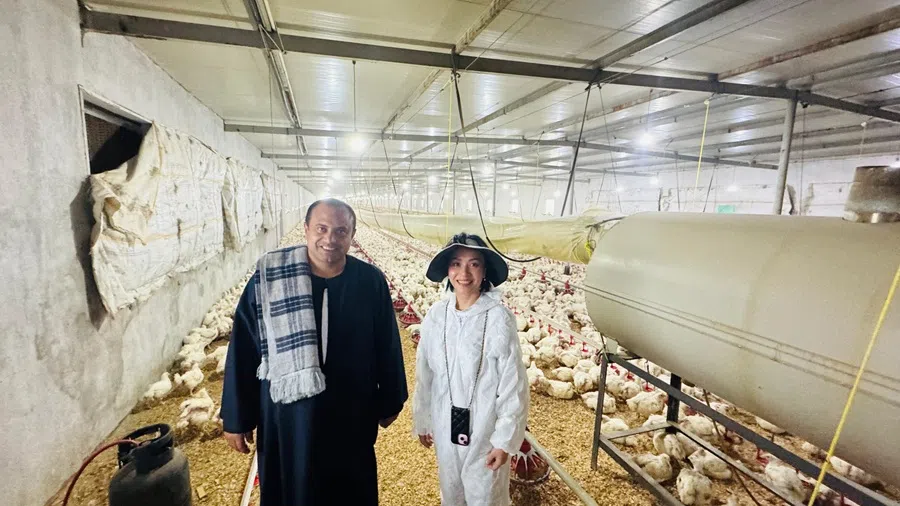
It’s a question she’s probably been asked many times. She smiled and said, “As people say, I was lucky in reincarnation — I could have ended up in a much fancier life.”
Initially, she didn’t take the “fancy” path because of her father.
As a founder of a private business, Liu Yonghao always wanted a successor. He had in the past openly mentioned that succession should happen early. He had admitted that his grasp of new economic concepts and technology paled in comparison with the younger generation, and believed that getting a young person to lead the company and become a key figure in the business would be a true test of sustainability in an enterprise’s development.
Succession is a common issue for many businesses, and the problem is even more pronounced in agriculture — which is as traditional an industry as you can get.
The making of an outstanding successor
In 2021, another well-known entrepreneur, the founder of New Oriental Group Michael Yu, said candidly on his talk show that Liu Yonghao’s ability to nurture a successor like Liu Chang has triggered the envy of quite a few entrepreneurs — including himself — and they all wanted to learn from the elder Liu.
Liu Yonghao once shared an anecdote: when Liu Chang wanted to join a singing competition at the age of 15, he put a stop to it.
Liu Yonghao once shared an anecdote: when Liu Chang wanted to join a singing competition at the age of 15, he put a stop to it.
With her dreams of becoming a singer shattered, Liu Chang said that she wanted to open a jewellery shop in Chengdu, Sichuan province. The elder Liu felt that might be a good way of cultivating his daughter’s business acumen, and immediately gave her a loan of 100,000 RMB.
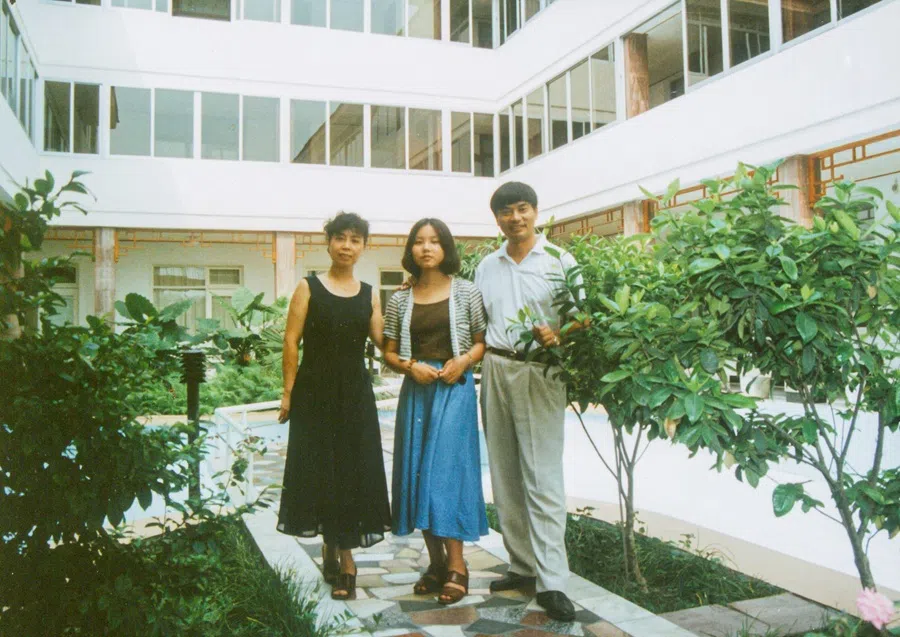
He was understanding of the younger generation’s resistance to take over the reins of the family business. “They may see their father’s work as difficult and exhausting, so they’re reluctant to take it on, preferring instead to pursue careers in investment, fashion, or the arts. It’s understandable, given that they grew up in very different times and circumstances,” the elder Liu had explained.
But he insisted that fostering a passion for their elders’ industry in the younger generation is a matter of nurture and gradual exposure, saying, “She had to learn to enjoy it over time.”
For Liu Chang, who joined the company at the age of 22, the first decade was a process of acceptance.
She realised what the industry could — and couldn’t — offer: no overnight fame or superstardom, but stability, long-term growth and freedom from fleeting trends or changing standards.
Inevitable yet accidental takeover
And then she accepted taking over the leadership of the group. Liu Chang said that things happened both by chance and by design. She had grown up alongside the company, and her father was a strongly passionate entrepreneur. She said that his entrepreneurial spirit had nurtured her as she grew up, and so it was natural for her to have inherited it. But it was purely by coincidence that she had come of age at the same time the company needed to become younger and more vibrant.
Liu sees her relationship with New Hope as that between the Little Prince and his “tamed” rose.
Liu candidly admitted that while the founding generation naturally had many stories that would become legends that can inspire others, this was unlikely to be the case for her as she was the result of a process.
She mentioned a line from the French tale The Little Prince, “You’re not at all like my rose. You’re nothing at all yet… No one has tamed you and you haven’t tamed anyone.”
Liu sees her relationship with New Hope as that between the Little Prince and his “tamed” rose.

“It’s not that I have accepted the terms ‘animal feed’ or ‘pig rearing’,” she explained. “Between me and the business, it’s a taming process. What tames me is the connection and trust at work between myself and the employees as well as upstream and downstream partners. This motivates me greatly.”
Over a decade of “taming”, the determination and capability Liu Chang has shown has not gone unnoticed by her father. “He feels there’s no need to worry when I’m in charge.”
Liu Yonghao has never shied away from heaping praise on his daughter in public. Once, on the subject of retiring while at the peak of his career, he said, “Times have changed, just like the waves at sea; we were once like a ship made of wood, running aground on the beach.
“When the younger generation arrived, they built a ship of steel — it can travel further, and withstand the wind and waves better. I may have been left stranded, but my son and daughter are still on board, and I feel very reassured.”
Crying three times a day when the going got too tough
During the interview, Liu Chang mentioned her gender identity as a woman more than once. She felt her willingness to succeed her father also has to do with a woman’s nature. Because of her presence, more and more capable women in the company have been promoted, and gained confidence and faith in their careers.
She said frankly that it was not easy being a woman in leadership, but there was no tone of grievance in her voice. Liu said that there were many hidden facets to being a female leader: she needed to have a clear strategy and be decisive, or even ruthless, while still conforming to society’s expectations of a woman, such as being communicative and gentle in manner.
And this general who has led her company into hard battles does not hide her feminine qualities. She openly admitted to breaking down in tears three times a day when the going was tough, crying in front of people from financial institutions as well as her own employees.
She once said in an interview that because of the immense pressure she faced at work, she wished to behave like a wilful girl in private with her husband.
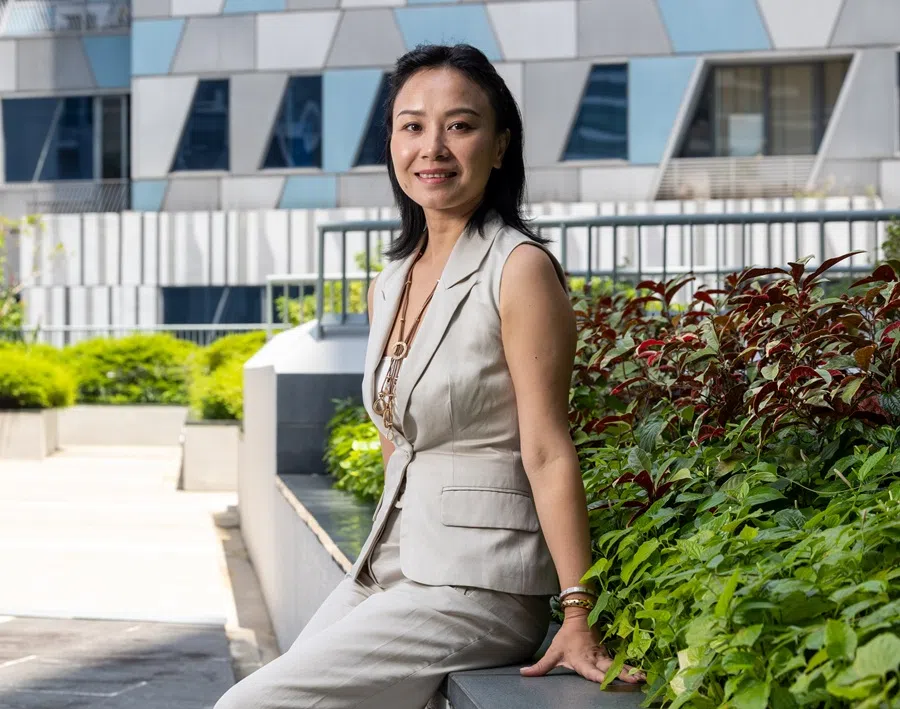
Like many married women, she was also looking forward to celebrating her tenth wedding anniversary. Liu Chang married director Sun Hao in 2015, a match that surprised many. There was no wedding nor honeymoon. She said, “Back then, I said we would celebrate if we could stay together for ten years. We would receive so many red packets if we had a wedding, and if we didn’t make it past a year and had to return the money, it would be bad.”
This year, the couple celebrate their tenth anniversary, but they have been too busy to organise a celebration to make up for the wedding they never held. In the end, Liu’s husband managed to organise a short getaway to the neighbouring Hubei province. But the hotel he picked was crowded and noisy — quite different from Liu Chang’s expectations of what a honeymoon should be like — and she felt let down.
It’s a side of her that is completely different from what others see in her role as company chair. The couple chat most often about the arts, and when her husband fails to understand her emotions, she might sulk. She once said in an interview that because of the immense pressure she faced at work, she wished to behave like a wilful girl in private with her husband.
Strategy is key to a successful marriage
Surprisingly, Liu uses “strategy” to describe the key to a successful marriage. As the wedding anniversary trip drew to a close, the couple found themselves at an izakaya — a Japanese-style bistro — chatting about their marriage and their hopes for the future over two bottles of wine. She gave him tips such as, “When I get emotional, you should pat me,” while her husband “wished he had a notepad to write everything down”.
“We outlined our strategy,” was how she described it.
This was followed by a smile, as she said, “I have to admit I am someone who is overly focused on efficiency, it’s the result of my experience over the past 20 years.”
In her relationship with her father, Liu also exhibits the duality of being a girl and an entrepreneur. For a long time, her father would have breakfast with Liu, her husband and their two children. One day, Liu suddenly found herself looking on at the scene as an observer, and saw two sets of father and daughter at the breakfast table: her husband and daughter were teasing each other, while she and her father would only ever talk about work.
She said it was a moment that led her to discover what she was missing — the doting affection between father and daughter.
But she has come to terms with the state of affairs. “There are different types of father-daughter relationships. There are people who envy how I can talk with my father frequently every day without any communication barriers. A single type of rice feeds a hundred types of people — I am a product of my environment, which makes me who I am.”
Seeking achievement, not success
In past interviews, Liu Yonghao had also provided a glimpse into his relationship with his daughter. Liu Chang first learnt how to swim at the beach at Sanya, Hainan. As the waves crashed over her, all Liu could do was keep swimming so that she would not drown.
But Liu Yonghao had been right behind his daughter all along.
In the past four years, Liu Chang struggled against the business downturn, emerging finally from the challenging times through her own ability, much like how she learnt to swim back then.
... she was reassured by a big hug and was surprised to find it was her father — it was one of the very few moments her father had shown tenderness.
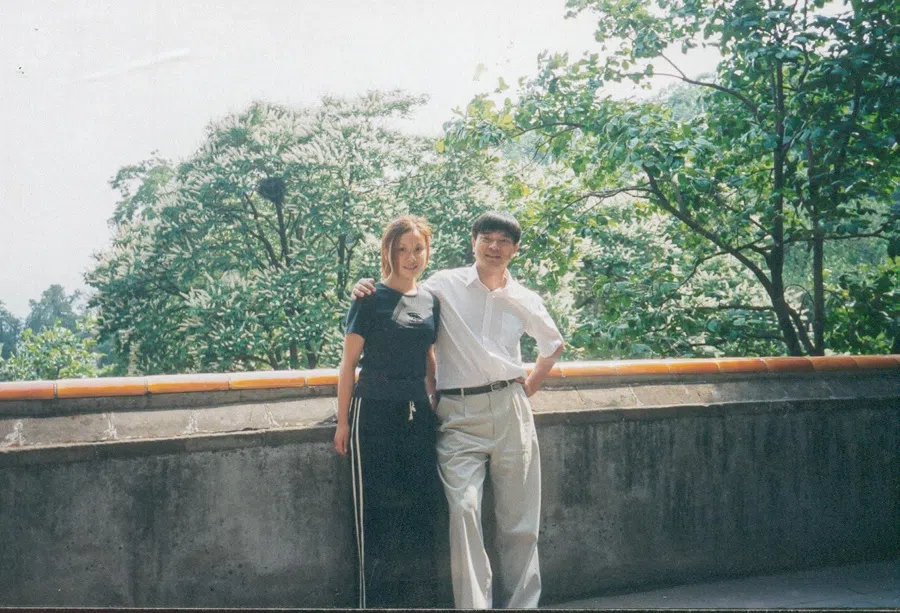
In a media interview last year, Liu Chang spoke about the time when she cried herself to sleep after discussing and analysing work matters with her father. Later on, she was reassured by a big hug and was surprised to find it was her father — it was one of the very few moments her father had shown tenderness.
She said as the successor to the founder, she is seeking not success but achievement.
“Success is about the story in the eyes of others, but achievement is about being confident with what has been attained. I don’t know if my story will grow from my achievement and perhaps one day inspire and encourage more successors who are willing to keep going to make things even better.”
This article was first published in Lianhe Zaobao as “中国民企新希望六和接班人刘畅:轻舟已过万重“战””.





